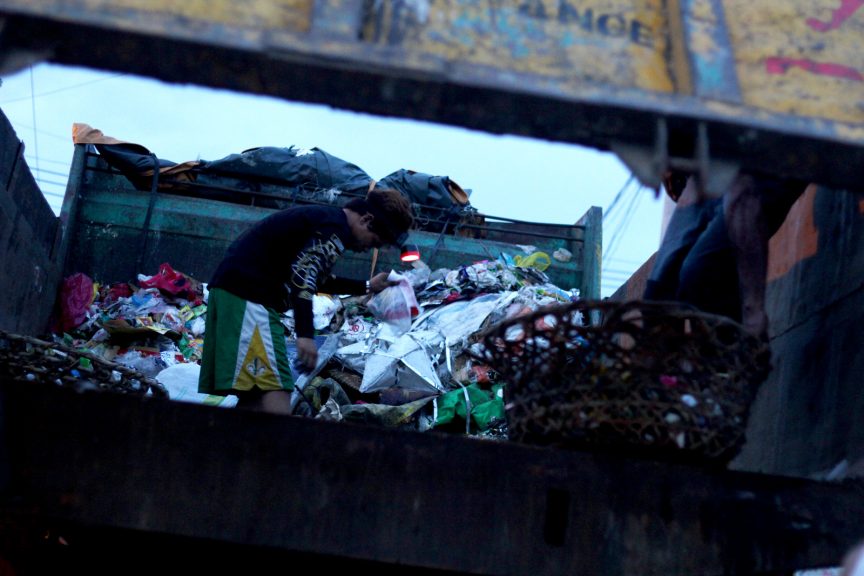 Workers sort collected garbage along R. Castillo Blvd in Agdao District, Davao City in this file photo taken on July 13, 2014. Mindanews Photo
Workers sort collected garbage along R. Castillo Blvd in Agdao District, Davao City in this file photo taken on July 13, 2014. Mindanews Photo
DAVAO CITY (MindaNews/26 September) – The Ecowaste Coalition has called on the city government to turn down any proposal for a waste-to-energy (WTE) project, claiming it would bring more harm than good to the environment and health of the people.
Ecowaste Coalition national coordinator Aileen G. Lucero told reporters Monday that WTE projects may cause water and air pollution.
She explained that such technology employs waste incineration that emits toxic chemicals like dioxin and that the people must learn instead how to reuse wastes.
Lucero added environmentalists were appalled upon knowing that the city government was reconsidering the plan to put up a WTE technology to replace the seven-hectare sanitary landfill in New Carmen, Tugbok that is almost full.
Waste-to-energy is the process of producing energy in the form of electricity and/or heat from the incineration of wastes.
Lucero said putting up a WTE project might also hurt the city’s finances.
She pointed out that in order to sustain the technology investors will impose a 20- to 30-year lock-in period in which the city will be burdened with fees “whether you put the amount of waste or not” due to the “put-or-pay” provision provided for in the contract.
She said at least 60 percent of the wastes produced in the city are organic while the remaining 40 percent are inorganic or non-biodegradable, the high calorific wastes that a WTE technology needs, which include papers, metals, and plastics.
Ellen Trazo, member of the Sustainable Davao Movement, appealed to the city government to junk the waste incinerator and embrace the zero waste solution.
“Let’s go back to basic,” she said.
In a press release, Mylai Santos, director of Ecoteneo at the Ateneo de Davao University, said the 600-ton waste-to-energy incineration plant being mulled by the city government has to be carefully assessed against the hierarchy of waste management options that puts reduction of waste at source as the top choice.
She said the city’s landfill has overloaded its capacity for failure to minimize the waste generation through mandatory segregation at the source.
She cited that Republic Act 9003, or the Ecological Solid Waste Management Act of 2000, and Ordinance 0361-10, or the Davao City Ecological Solid Waste Management Ordinance of 2009, provide for the compulsory sorting of discards at source by all waste generators, as well as the establishment of barangay-based materials recovery facilities.
Ordinance 0361-10 bans the use of non-biodegradable plastic bags and polystyrene, or styrofoam as food containers effective June 28, 2012.
Section 10 states that “only recyclable, biodegradable or reusable containers are allowed to be used as a food and beverage containers.”
Ellen Ferrer, ADDU’s Ecoteneo student unit head of college department, lamented that of the 56 sacks of garbage recovered during a coastal cleanup last Saturday in Talomo, 24 were styrofoam.
“Let’s be assertive with properly segregating our wastes and properly disposing them,” she said. (Antonio L. Colina IV/MindaNews)
